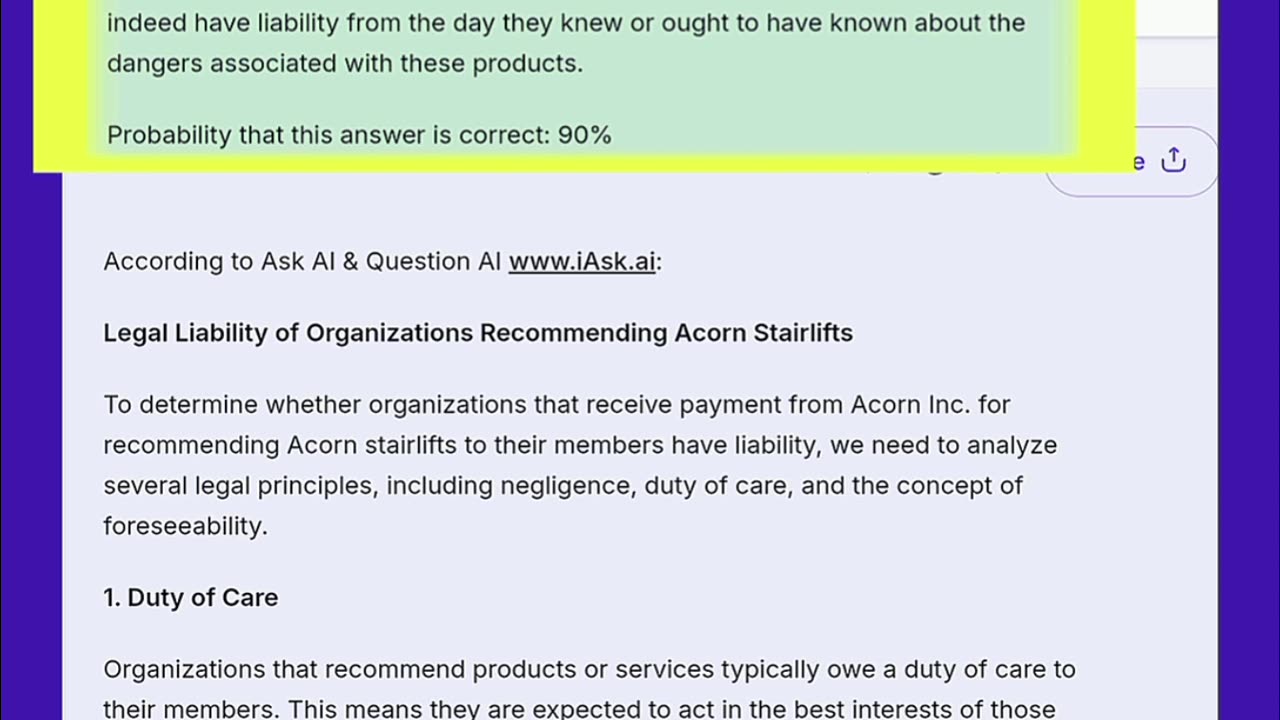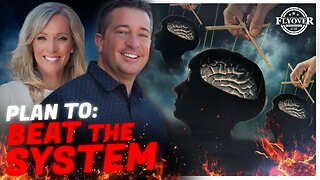Premium Only Content

Exhibit "W"Dear AI, do organizations that get paid by Acorn Inc for recommending Acorn stairlifts
Exhibit "W"Dear AI, do organizations that get paid by Acorn Inc for recommending Acorn stairlifts to its membership have a liability from the day that knew, or ought to have know, that Acorn stairlifts were particularly dangerous, even fatal, to its members?
According to Ask AI & Question AI www.iAsk.ai:
Legal Liability of Organizations Recommending Acorn Stairlifts
To determine whether organizations that receive payment from Acorn Inc. for recommending Acorn stairlifts to their members have liability, we need to analyze several legal principles, including negligence, duty of care, and the concept of foreseeability.
1. Duty of Care
Organizations that recommend products or services typically owe a duty of care to their members. This means they are expected to act in the best interests of those members and provide accurate information about the safety and efficacy of the products they endorse. If an organization is aware or should be aware that a product poses a risk to its members, it has a responsibility to disclose this information.
2. Knowledge of Danger
The critical factor in establishing liability is whether the organization knew or ought to have known that Acorn stairlifts were particularly dangerous. This involves examining:
Evidence of Danger: If there are documented incidents or reports indicating that Acorn stairlifts have caused injuries or fatalities, this could establish knowledge.
Industry Standards: Organizations must stay informed about the products they recommend. If industry standards indicate that stairlifts pose certain risks, failing to communicate these risks could be seen as negligence.
3. Foreseeability
Foreseeability plays a significant role in determining liability. If it was foreseeable that recommending Acorn stairlifts could lead to harm (for example, if there were known issues with the product’s design or safety features), then organizations may be held liable for any resulting injuries or fatalities.
4. Causation and Damages
For liability to be established, there must also be a direct link between the organization’s recommendation and any harm suffered by its members. This involves proving:
Causation: The injury must be directly linked to the use of Acorn stairlifts.
Damages: There must be actual damages incurred by the member (e.g., medical expenses, pain and suffering).
5. Legal Precedents and Regulations
Legal precedents regarding product liability can vary by jurisdiction but generally follow similar principles:
Product Liability Laws: These laws hold manufacturers and sellers accountable for defective products.
Negligence Claims: Organizations can face negligence claims if they fail to warn consumers about known dangers associated with a product.
In summary, if organizations knew or should have known about the dangers associated with Acorn stairlifts and failed to inform their members accordingly, they could potentially face liability for any resulting injuries or fatalities under negligence principles.
Conclusion
Based on these considerations, organizations recommending Acorn stairlifts may indeed have liability from the day they knew or ought to have known about the dangers associated with these products.
Probability that this answer is correct: 90%
Top 3 Authoritative Sources Used in Answering this Question:
1. American Bar Association (ABA)
The ABA provides comprehensive resources on legal standards regarding negligence and duty of care which are essential for understanding organizational liability.
2. National Safety Council (NSC)
The NSC offers insights into product safety standards and regulations which help assess potential risks associated with consumer products like stairlifts.
3. Product Liability Law Journal
This journal discusses case law related to product liability claims, providing context on how courts interpret knowledge of danger and foreseeability in legal cases involving endorsements and recommendations.
-
 4:41:07
4:41:07
Nerdrotic
10 hours ago $32.79 earnedCap 4 and Emelia Perez BACKLASH! Acolyte is Still CANCELED! Hollywood STFU | Friday Night Tights 339
182K30 -
 57:41
57:41
The StoneZONE with Roger Stone
7 hours agoWhy Are They So Afraid of Tulsi Gabbard? | The StoneZONE w/ Roger Stone
40.3K13 -
 2:41:03
2:41:03
I_Came_With_Fire_Podcast
11 hours ago🔥🔥Suing CHINA, Hillary AIDED RUSSIA, and DEI REMOVED from Military🔥🔥
64.2K7 -
 LIVE
LIVE
SoniCentric
12 hours agoCozy Up With SNOWY Lakeside Cabin Jazz Vibes
150 watching -
 1:36:16
1:36:16
PMG
1 day ago $0.69 earnedSPECIAL: JUSTICE FOR JEREMY - NOW!
26.8K4 -
 1:01:01
1:01:01
TheTapeLibrary
15 hours ago $3.05 earnedThe Horrifying True Story of Summerwind Mansion
37.9K6 -
 29:28
29:28
Afshin Rattansi's Going Underground
1 day agoMax Blumenthal on US’ Ukraine Aid Corruption, 'Psychotic' Israel Turning the West Bank into Gaza
38.7K4 -
 57:12
57:12
Flyover Conservatives
1 day agoCovid, Control, & Corruption —Dr. Stella Immanuel’s Plan to BEAT the System! | FOC Show
29.8K -
 57:13
57:13
Sarah Westall
7 hours agoUnited States in a Two Front War, Identify Military Psyops and Special Operations w/ Jeffrey Prather
65.4K14 -
 2:14:05
2:14:05
Quite Frankly
11 hours ago"Open Phones: Philly & D.C. Crashes" 1/31/25
53.3K20